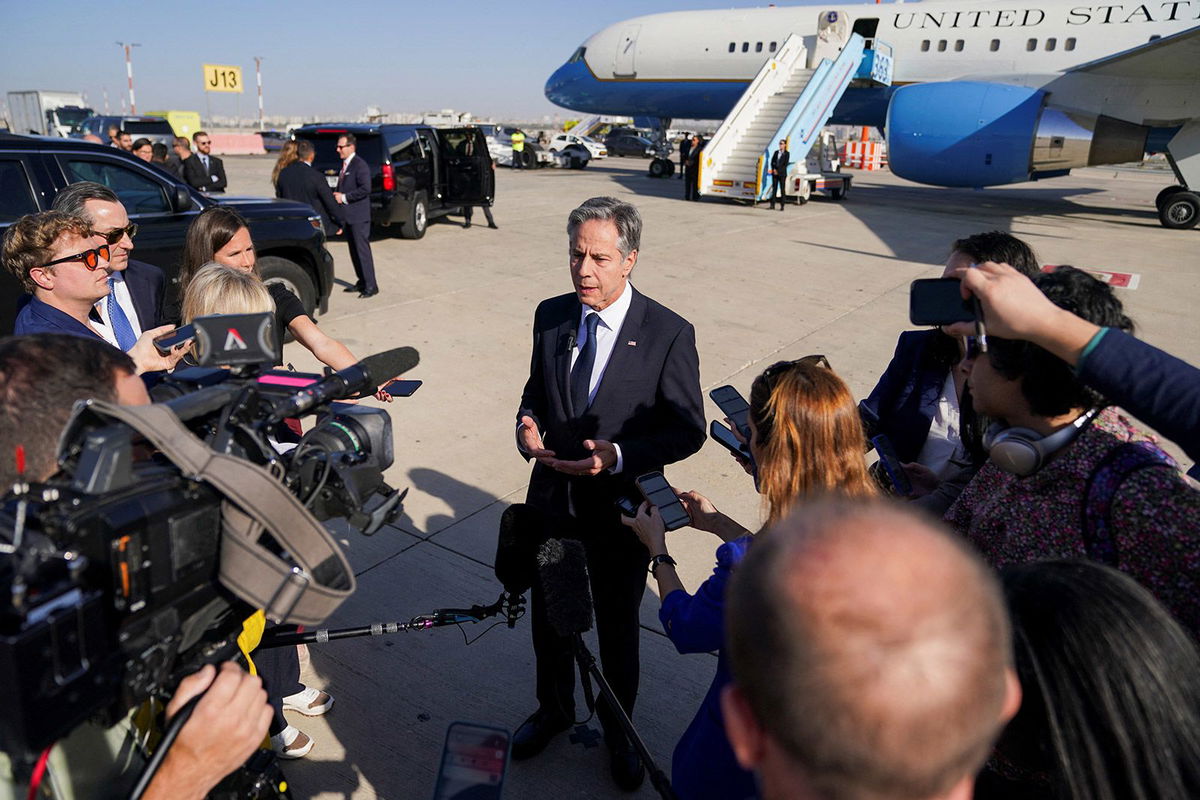Blinken heads to Brussels as European diplomats brace for four more years of Trump

Secretary of State Antony Blinken speaks with members of the media at Ben Gurion International Airport in Tel Aviv
By Kylie Atwood and Jennifer Hansler, CNN
(CNN) — US Secretary of State Antony Blinken heads to Brussels Tuesday as President-elect Donald Trump’s possible moves on support for Ukraine, NATO and tariffs raise serious questions and concerns among European officials.
The trip comes a week after the US presidential election and as European leaders brace for another four years of Trump. In the wake of the US election, European leaders like France’s Emmanuel Macron pledged “a more united, stronger and more sovereign Europe,” even as governments like Germany’s Olaf Scholz’s are on the brink of collapse.
“There has been a strategic awakening that we must embrace as Europeans. We cannot entrust our security to the Americans forever,” Macron said Thursday.
Trump and his running mate, JD Vance, have cast strong doubts on continued US commitment to Kyiv as the war drags on more than two-and-half years after Russian forces invaded. Moreover, Trump has made comments that suggest the US could pressure Ukraine into an uneasy truce with Russia. During his campaign, Trump also indicated he would only adhere to NATO’s mutual defense commitment for countries who are contributing enough of their annual budgets to defense.
During the campaign, Trump said “one of the presidents of a big country” at one point asked him whether the US would still defend the country if they were invaded by Russia even if they “don’t pay.”
“No, I would not protect you,” Trump recalled telling that president. “In fact, I would encourage them to do whatever the hell they want. You got to pay. You got to pay your bills.”
When it comes to economic issues, Trump used the campaign trail to float a universal 10% tariff, which has put European allies on edge after experiencing Trump’s focus on tariffs during his first term.
Current US diplomats have privately encouraged their European colleagues to use what could be the final meeting with Blinken to raise some existing irritants in the US-European relationship – such as the existing aluminum tariffs that went into effect during Trump’s first term – so that they are on the record discussing these issues before Trump comes into office.
Blinken will meet Wednesday with “his NATO and European Union counterparts to discuss support for Ukraine in its defense against Russia’s aggression,” the State Department announced Tuesday.
On NATO, countries in the defensive alliance expect the pressure on spending will likely be renewed by Trump – but not everyone expects that to turn into a crisis.
One former US diplomat recalled the consternation of European allies during Trump’s first term and noted that Trump’s foreign policy is likely to remain transactional. They also expect that the incoming president’s harsh rhetoric about defense spending, which alarmed many European diplomats, to continue. At the same time, the diplomat noted, countries did end up increasing their defense spending.
This diplomat said a trip by Blinken to NATO was to be expected following the election, given the Biden administration’s key foreign policy mantra of rebuilding alliances.
“We’re back. That’s what they kept saying. And of course, it isn’t lost on many people …they were saying you’re back, but for how long? And here’s the answer,” they said.
Under the Biden administration, the US has provided tens of billions of dollars in aid to Ukraine, in the form of both weapons and budget assistance. The administration plans to continue to surge as much support as possible to Kyiv before Trump takes office and NATO has put new measures into place to assure long-term assistance to Ukraine from the defense alliance.
Trump and Ukrainian President Volodymyr Zelensky spoke by phone last Wednesday, and the two “agreed to maintain close dialogue and advance our cooperation,” according to Zelensky. In remarks the following day, the Ukrainian president described the conversation as “productive” and noted that “we cannot yet know what his specific actions will be. But we hope that America will become stronger.”
“It is up to Ukraine to decide what should and should not be on the agenda for ending this war,” he added. “Any country, any leader who respects international law and sits at this table should understand that predators always demand more and more.”
Europeans are worried that with the US shrinking its support for Ukraine, the burden will fall on them to continue providing major support – which could prove particularly difficult if their economies are impacted by any Trump tariffs.
Leading up to the election and increasingly in the days following the election, European officials were busy brainstorming what their countries are doing already that they can showcase to impress Trump, US diplomats said.
Some countries are planning to highlight their current trade relationships with the US and how many jobs their businesses have brought to the US. Other countries believe that their tough on crime or tough on immigration policies might resonate well with the new Trump White House. Still how they present those wins is yet to be determined.
The-CNN-Wire
™ & © 2024 Cable News Network, Inc., a Warner Bros. Discovery Company. All rights reserved.